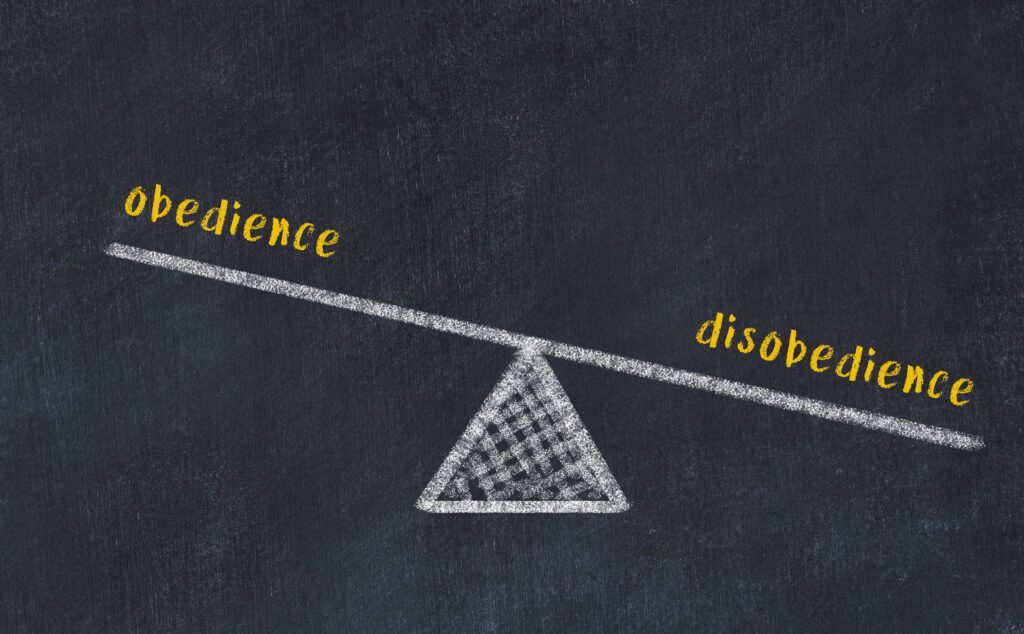“Justin, sit down!”
Enraged, I stood for a few beats more.
Then I sat down.
Sort of.
My eyes glared at my supervisor. He was forty years my senior. But it didn’t matter to me. All I could see was his sin (my immaturity blinded me to mine).
So, I kept standing, on the inside.
As disciples we often relate to God the way I related to my supervisor. We obey on the outside and disobey on the inside.
Biblical obedience demands more of us. The truth is, that day every part of me should have been sitting. But, like many young disciples, I struggled with obedience before both God and man. I vividly remember wrestling with the disparity between my outer behavior and my inner reality. I felt like a “white-washed tomb,” holy on the outside, but rebellious and disobedient on the inside.

If I’m honest, there are times I still feel that way. Can you relate?
God calls us to more than external obedience though. He calls us to surrender. He calls us to unite our actions, emotions, and motivations (Matt. 22:37-38). Growing into this sort of obedience is a big part of discipleship. But how? What tools are available to us to recognize our current level of obedience and step forward into the next one?
Most disciples and disciple makers don’t have any tools for this. A tool that can measure our obedience to God also measures our love for God. After all, disciples obey in direct proportion to our love (John 14:21, 1 Jn. 5:3-4, Lk. 7:47).
Today I want to share with you a tool that does just that. It’s called the Five Levels of Obedience Tool. This tool helps every disciple by presenting a ladder of obedience progress that enables assessment and a vision for more complete obedience.
Level 1: Inconsistent Obedience – “I’ll do what I want.”
Infant disciples make up most of those at this stage. Sometimes they are aware of what God desires, but don’t yet care enough to put what God’s desires above their own. They obey at times, but it’s more coincidence rather than commitment. When it’s convenient they do what He wants, otherwise they ignore it. In most cases, spiritual infants react more than reflect and have ample opportunity to learn about the power and effects of sin.
Levels 2-4 reflect a transactional relationship with God. It’s complicated. They obey to give a bit to get a bit.
Level 2: Conditional Obedience “If God gives me what I want then I’ll give Him what He wants.”
Disciples at this level relate to God as their servant. They sit in the place of power and control in the relationship. They obey if God behaves and leave if He doesn’t. Ironically, most disciples initially approach God for relationship on this level. Our first “want” is typically forgiveness of sin or another desperate place as we approach Him. In this way, even our initial surrender is sin-stained. Disciples at this stage don’t understand the nature of God or the type of relationship God desires.
Level 3: Provisional Obedience “I’ll give God what He wants as long as He meets my needs.”
There are two main differences between Level 2 and Level 3. To start, at this stage the disciple obeys first and allows God to respond. Second, the disciple only demands their needs be met, instead of needs and wants. Progress has been made in understanding God’s nature and what He desires, but there’s still a long way to go.
Level 4: Future-Happiness Obedience “I’ll give God what He wants, believing—in faith—that at some point, I’ll get what I need and want.”
Disciples at this level have taken a huge step forward. Many mature Christians live at this level and believe that it’s the highest level of obedience. They have learned that God is God they are not. It is theirs to obey, now, not later. They can take their needs and wants to God and believe—in faith—that He will provide. His provision may not come until they get to Heaven, but it is His to decide. Still, there is an element of obedience in exchange for delayed gratification here. There’s still more room to grow in obedience.
Level 5: Unconditional Obedience “I’ll Give God What He wants.”
Disciples at this level have surrendered their wants and their needs to God. They have internalized the truth of Jeremiah 10:23, “I know, O Lord, that a man’s life is not his own; it is not for man to direct his steps.” They have rightly taken the inferior position in the relationship and act out of a place of loving trust. This is the level of obedience that we should all be seeking.
A couple final points, First, we don’t live on just one level. Disciples move back and forth from one level to another depending on the issue or the day. That’s normal.
Second, it’s important to remember that doing the right thing is always better than doing the wrong thing. So, obedience is always better than disobedience—regardless of the motivation. As we grow to maturity, the nature of our obedience changes. It grows from intermittent and partial to consistent and holistic.
So where do you usually fit with regard to these levels? Take the time to assess your obedience before God. If you are a discipling someone do it with them as well. Ask God to help you grow a unified obedience that has you sitting on the inside and out!
About the Author

Justin Gravitt
Related Posts

Is Being Discipled a Need or a Luxury?
What would you say? Is being discipled a need or

Let’s Take Fellowship a Step Higher and Call It Disciplemaking!
I’m always looking for new pictures to express familiar truths.

Discovering God in the Detour
As we ponder a variety of landscapes that God takes

